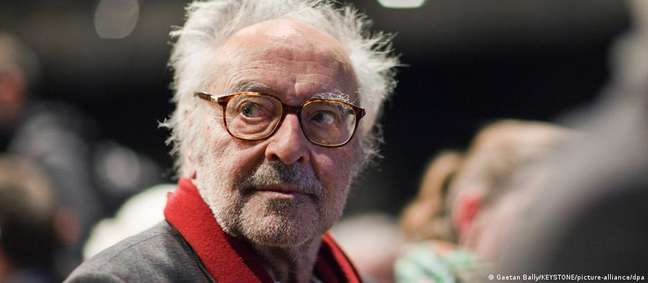One of the leading names in world cinema, a Franco-Swiss director was 91 years old. In 2010 he was awarded an Oscar for the life of his work. French-Swiss director Jean-Luc Godard, one of the leading names in world cinema, has died at the age of 91, French newspaper Liberation reported Tuesday (13/09), citing sources close to the director. The cause of death was not disclosed.

In the 1960s he was one of the founders of the Nouvelle Vague, a French movement that revolutionized cinema in the 1950s.
Godard has a long and award-winning career, ranging from Best Director Award at the Berlin Film Festival for Besieged (1960) to a Lifetime Oscar in 2010, which he did not attend.
In his nearly 70-year career, Jean-Luc Godard has produced more than 60 films, including more than 40 feature films, numerous shorts, experimental documentaries, highly intellectual film essays, music videos, some even as a screenwriter or co-director, while al alongside his teammates from the Nouvelle Vague. However, he remained the most radical representative of this new way of making modern and daring films.
Among his most important works are, in addition to Assaulted, O contempt (1963), Viver a vida (1962), Alphaville (1965) Week-End à française (1967), Carmen de Godard (1983), Eu Vos
I greet Maria ou Je vous salue, Marie (1985) and Adeus à Língua (2014).
“I was making films like a jazz musician: pick a theme, improvise and somehow it all works out by itself,” he once observed, recalling his beginnings in the seventh art.
Cinema is better than university
Godard was born in Paris on December 3, 1930, the son of a Swiss ophthalmologist. He and his three brothers grew up in their father’s land, but in 1943 the family returned to France, where Jean-Luc attended high school. He had to repeat the final test three times, because he always had other things on his mind.
Even studying anthropology at the Sorbonne University did not particularly interest him: he preferred to entertain himself in the cinema and in Parisian intellectual circles. Instead of attending classes, he went to the movies every day, which resulted in the suspension of his father’s allowance.
Now having to earn his living with a casual job, he passionately devoted himself to writing articles for the Gazette du Cinéma magazine. A trip to the United States in 1950-51 sealed his future: in 1954 he made his first film, the documentary Opération Beton, about the construction of a gigantic dam.
Both he and Eric Rohmer, Jacques Rivette, François Truffaut and Claude Chabrol began their careers as film critics and collaborating with the magazine Cahiers du Cinéma. For all, the conventional narrative of the old films was totally outdated.
“New wave”
Truffaut, a friend and companion of Godard’s intellectual discussions, kicked off the “new wave” with Les Misunderstood. In May 1959, the film premiered in Cannes.
The following year it was Godard’s turn with the legendary Besieged, inspired by Hollywood’s black and white gangster films. Both hand-held camera shooting, instead of the usual complex apparatus, and the innovative cutting technique were all the rage at the festival in the south of France.
The films of the Nouvelle Vague reflected the way of looking at the life of a new generation of French directors, who wanted to see reality on the screen, raw and raw, authentic and palpable. The appellation was soon established, also closely associated with Godard.
Intellectual and formal audacity
In Contempt, 1963, Brigitte Bardot, in her first film role, philosophized in front of the camera whether her screen mate found her ass attractive – a scandal for the time. In 1980, Godard would repeat this scene in Save Yourself (A Vida), this time with Isabelle Huppert, in front of cows in a barn.
The heavy cigar smoker has never used screenplays in his films, giving too much to chance, to discussions on the set or to the improvisational talent of his actors. And among them were practically all the big names in French cinema, from Eddie Constantine, Alain Delon, Michel Piccoli and Yves Montand to Gérard Depardieu and Juliette Binoche, in addition to the aforementioned Bardot and Huppert.
Godard’s audacity is also manifested in the formal field: his film essays are “conceived in the form of montage”, described in 2010 by a critic of the daily Frankfurter Rundschau, his film editing is as associative as improvisation in jazz.
He was also one of the first French directors to shoot with a light and agile video camera. It was with one of them that, in 1968, he accompanied the Rolling Stones in the studio, for the production of their legendary album Sympathy for the Devil, obtaining a documentary that remains cult.
You start again on the international scene
Under the impression of the May 1968 student protests in Paris, Godard joined a radical Marxist-Leninist film group. The growing politicization of his work sparked a fight with his friend Truffaut. Then he “disappeared into the collective”, starting to shoot only with others, as one critic noted at the time.
In 1980 Godard returned to the international cinema scene. Played by Isabelle Huppert, Save Yourself (A Vida) was a programmatic title for the mature director’s new beginning. In an interview, he described this as his “second first movie”.
A Palme d’Or at Cannes, the European Film Award, an Oscar for a lifetime of work: so far these public awards have meant nothing to the restless Swiss-French director. He wore a jacket and tie only to receive the very rich Praemium Imperiale in 2002, considered the “Nobel of arts”.
md / lf (Reuters, DW)
Source: Terra
Emily Jhon is a product and service reviewer at Gossipify, known for her honest evaluations and thorough analysis. With a background in marketing and consumer research, she offers valuable insights to readers. She has been writing for Gossipify for several years and has a degree in Marketing and Consumer Research from the University of Oxford.

![Un Si Grand Soleil preview: Thursday, October 23, 2025 episode recap [SPOILERS] Un Si Grand Soleil preview: Thursday, October 23, 2025 episode recap [SPOILERS]](https://fr.web.img6.acsta.net/img/12/a9/12a96513d7a4f6120d33b7120427505f.jpg)


